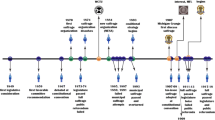Abstract
Within political science, a movement focused on increasing the credibility of causal inferences (CIs) has gained considerable traction in recent years. While CI has been incorporated extensively into most disciplinary subfields, it has not been applied often in the study of American political development (APD). This special issue considers ways in which scholars of CI and APD can engage in mutually beneficial ways to produce better overall research. As the contributions to the symposium demonstrate, clear scientific gains are to be had from greater CI–APD engagement.
Similar content being viewed by others
Notes
While one might try to work around such problems by making use of hypothetical experiments, concerns about external validity will loom large.
Our focus here is on APD and historical American politics. CI also has had a limited impact on historical political science more generally.
The Dornsife College of Letters, Arts and Science at the University of Southern California provided matching funds.
We note that APD scholars often want to understand a particular case and may not care if its cause generalizes to other situations. Put differently, while individual APD scholars may not think much about external validity, we believe that their collective efforts and published work, when assembled and integrated by CI scholars, often can be made to speak to more general phenomena.
The two themes also appear in recent work that is not part of the symposium. For example, in his recent book providing an analytical history of constitutional decision making, Clark (2019, p. 317) notes that his “goal has been to strike something of a middle ground between historical description and traditional social-scientific causal inference.” He notes that “while at times the evidence does not rise to the level of what has come to be known as a ‘credible’ causal estimate, the invocation of an underlying, micro-founded theory of decision making has aided in the interpretation of those patterns.”
References
Angrist, J. D., & Pischke, J.-S. (2009). Mostly harmless econometrics: An empiricist’s companion. Princeton: Princeton University Press.
Bateman, D. A., & Teele, D. L. (2019). A developmental approach to historical causal inference. Public Choice. https://doi.org/10.1007/s11127-019-00713-4.
Binder, S. (2019). How we (should?) study Congress and history. Public Choice. https://doi.org/10.1007/s11127-019-00693-5.
Cartwright, N. (2007). Are RCTs the gold standard? Biosocieties, 2(1), 11–20.
Caughey, D., & Chatfield, S. (2019). Causal inference and American political development: Contrasts and complementarities. Public Choice. https://doi.org/10.1007/s11127-019-00694-4.
Clark, T. S. (2019). The Supreme Court: An analytical history of constitutional decision making. New York: Cambridge University Press.
Clinton, J. D. (2019). The effect of majority party agenda setting on roll call. Public Choice. https://doi.org/10.1007/s11127-019-00706-3.
Deaton, A., & Cartwright, N. (2018). Understanding and misunderstanding randomized controlled trials. Social Science and Medicine, 210, 2–21.
Evans, P. B., Reuschemeyer, D., & Skocpol, T. (Eds.). (1985). Bringing the state back in. New York: Cambridge University Press.
Gailmard, S. (2019). Game theory and the study of American political development. Public Choice. https://doi.org/10.1007/s11127-019-00705-4.
Galvin, D. (2019). Let’s not conflate APD with political history, and other reflections on “causal inference and American political development”. Public Choice. https://doi.org/10.1007/s11127-019-00695-3.
Gelman, A., & Imbens, G. (2013). Why ask why? Forward causal inference and reverse causal questions. National Bureau of Economic Research, working paper no. 19614.
Gordon, S. C., & Simpson, H. K. (2019). Causes, theories, and the past in political science. Public Choice. https://doi.org/10.1007/s11127-019-00703-6.
Grose, C. R., & Wood, A. K. (2019). Randomized experiments by government institutions and American political development. Public Choice. https://doi.org/10.1007/s11127-019-00704-5.
Harvey, A. (2019). Applying regression discontinuity designs to American political development. Public Choice. https://doi.org/10.1007/s11127-019-00696-2.
Holland, P. W. (1986). Statistics and causal inference. Journal of the American Statistical Association, 81(396), 945–960.
Imbens, G. (2010). Better LATE than nothing: Some comments on Deaton (2009) and Heckman and Urzua (2009). Journal of Economic Literature, 48(2), 399–423.
Jenkins, J. A., & Stewart, C. (2019). Causal inference and American political development: The case of the Gag rule. Public Choice. https://doi.org/10.1007/s11127-019-00754-9.
McConnaughy, C. M. (2019). The inferential opportunity of specificity: How institutional and historical detail can enable causal explanations and inference in American political development. Public Choice. https://doi.org/10.1007/s11127-019-00710-7.
Orren, K., & Skowronek, S. (2004). The search for American political development. Cambridge: Cambridge University Press.
Rubin, D. B. (1974). Estimating the causal effects of treatments in randomized and non-randomized studies. Journal of Educational Psychology, 66(5), 688–701.
Rubin, D. B. (1977). Assignment to treatment groups on the basis of a covariate. Journal of Educational Statistics, 2(1), 1–26.
Rubin, D. B. (2006). Causal inference using potential outcomes: Design, modeling, decisions. Journal of the American Statistical Association, 100(469), 322–331.
Schickler, E. (2016). Racial realignment: The transformation of American liberalism, 1932–1965. Princeton: Princeton University Press.
Schickler, E. (2019). Causal inference and American political development: Common challenges and opportunities. Public Choice. https://doi.org/10.1007/s11127-019-00690-8.
Sheingate, A. D. (2014). Institutional dynamics and American political development. Annual Review of Political Science, 17(1), 461–477.
Wawro, G. J., & Katznelson, I. (2019). American political development and new challenges of causal inference. Public Choice. https://doi.org/10.1007/s11127-019-00708-1.
Author information
Authors and Affiliations
Corresponding author
Additional information
Publisher's Note
Springer Nature remains neutral with regard to jurisdictional claims in published maps and institutional affiliations.
Rights and permissions
About this article
Cite this article
Jenkins, J.A., McCarty, N. & Stewart, C. Learning from each other: causal inference and American political development. Public Choice 185, 245–251 (2020). https://doi.org/10.1007/s11127-019-00728-x
Received:
Accepted:
Published:
Issue Date:
DOI: https://doi.org/10.1007/s11127-019-00728-x




